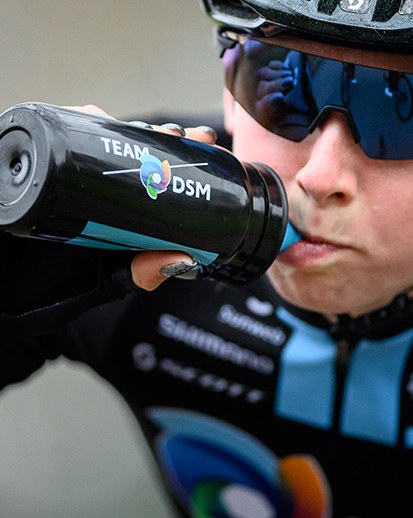Suppliers
The DSM Sustainable Procurement Program
Sustainability is at the heart of everything DSM does. Our Sustainable Procurement Program is instrumental in ensuring that we deliver together with our suppliers on our promise to reduce our environmental footprint and improve the lives for people today and generations to come through our activities, products and innovations.
Our Sustainable Procurement Program is comprised of three elements:
- Supplier development and evaluation program, where we focus on assessing, auditing and further improving our suppliers’ sustainability performance by actively developing and following up on corrective actions
- Our Scope 2 program on reducing greenhouse gas emissions from purchased electricity
- Our Scope 3 program emissions on reducing greenhouse gas emissions throughout our value chain, where we are working together with our suppliers on our collective carbon footprint and emissions
Since 2020, in addition to renewable electricity, procurement is working to enable a sustainable decarbonization of heat via renewable fuels.
|
|
2020 |
|
2019 |
|
|
|
|
|
Spend coverage SCoC |
|
93% |
|
95% |
EcoVadis assessments |
|
351 |
|
322 |
Together for Sustainability audits |
|
14 |
|
15 |
Supplier Code of Conduct
The business principles most relevant for the supply chain are brought together in the Supplier Code of Conduct (SCoC) and structured along the three sustainability dimensions of People, Planet and Profit. The Supplier Code of Conduct (available on the DSM Supplier website in eight languages) forms the basis on how we choose to do business and interact with our suppliers. In 2020, 93% of our supplier spend was covered by the SCoC versus our target level of 95%. Through Together for Sustainability assessments and audits, we check that suppliers act in compliance with our norms and values. When suppliers cannot meet our expectations, we will work with them to define and execute an improvement plan.
Assessing sustainability in our supply chain
At DSM, we understand that connecting across complex value chains is not easy. This is why we are a member of the Together for Sustainability (TfS) initiative. TfS aims to develop and implement a global supplier engagement program that assesses and improves sustainability practices on both environmental and social aspects. More information about this program can be found on our website.
In 2020, despite the COVID-19 pandemic and the focus needed to manage the value chain by DSM and our suppliers, we continued our focus on driving improvement to support sustainability development in the value chain. We assessed 351 suppliers in 2020 through TfS, of which 318 were re-assessments. 60% of our re-assessed suppliers received an improved sustainability score, compared to 57% last year, which indicates that our suppliers are further engaging in sustainability.
TfS site audits were impacted by contact and travel restrictions throughout the year. As a consequence, we looked for new ways to conduct audits, and DSM took the lead through TfS to pilot its first virtual audit. The virtual audit used technology to conduct the audit, assessment, inspection and oversight from a remote location. This allowed us to proceed with the audit of the supplier as well as practice and evaluate virtual audits for the future.
Capabilities to enhance sustainability
The year also saw the TfS community gathered at the TfS Annual Workshop, attended by nearly 130 working members. The virtual gathering came at a pivotal time in TfS’s history with the launch of the TfS Grow & Deliver strategy, delivering the strategic roadmap 2020–2025 for how to make global chemical supply chains more sustainable. During the workshop, we had the opportunity to share our journey of Sustainable Procurement in a panel discussion in which we shared our approach, successes and hurdles of integrating sustainability into our procurement processes.
Furthermore, TfS organized a featured supplier training for Chinese petrochemical companies at the 2020 China Petroleum and Chemical International Conference in Nanjing. As an active TfS member, we led the organization of this year’s training with the support of one other member company. About 500 participants including suppliers, TfS members and industry organization representatives were present. The training focused on how to build a sustainable chemical supply chain and the specific requirements for chemical companies. It also offered an opportunity for suppliers to obtain a more in-depth understanding of what is required in a TfS assessment and audit.
Further training in sustainability was provided to our procurement community. Three trainings were offered with practical tools on integrating sustainability into the daily work of Procurement professionals, specifically on sustainable procurement, Together for Sustainability assessments and audits, and scope 3. These trainings aim to equip our colleagues with the knowledge and information to engage in the relevant sustainability conversations with our suppliers.
Stakeholder engagement
A strong, sustainable — and circular — value chain is only as strong as its weakest link. In addition to working with our suppliers, we also work with external partners to enhance collaboration in the supply chain. These partners include Roundtable for Sustainable Palm Oil (RSPO), Friends of the Sea, the Marine Stewardship Council and Together for Sustainability (TfS).
Taking steps toward sustainable palm oil derivatives
We are actively taking steps to reduce deforestation by sourcing ingredients like palm oil derivatives in a more sustainable way. For example, we are a member of the RSPO — a not-for-profit, multi-stakeholder organization aimed at making sustainable palm oil the market norm. We aim to have RSPO certification for all of our major production sites that use palm oil derivatives. Through our business group DSM Nutritional Products, we are a member of RSPO. DSM Food Specialties and DSM Nutritional Products met their objective to use 100% RSPO certified sustainable palm oil products using RSPO ‘Mass Balance’ supply chain models by 2020.
Responsibly sourced marine resources
Protecting our marine environment is important to us as a company. We are committed to the responsible and sustainable use of natural marine resources. We have Friends of the Sea certification for all our fish oil purchases. This helps ensure that the fisheries involved in providing fish oil for the production of our omega-3 product range are sustainable. Furthermore, we successfully attained 100% Marine Stewardship Council (MSC) certification for all our tuna oil suppliers in 2020. We are proud to partner with the MSC, the global gold standard for certification and eco-labeling of seafood, to offer MEG-3® tuna DHA oils and powders that are MSC Chain of Custody (CoC) certified. This certification guarantees ‘ocean to purchase’ traceability throughout the entire supply chain, providing assurance that our tuna DHA products can be easily traced to certified fisheries.
Supplier projects
As part of our drive to foster better business through our supplier projects, our procurement organization engages in proactive dialogue with suppliers in order to move the business agenda forward in our Focus Domains of Nutrition & Health, Climate & Energy, and Resources & Circularity. In this context, DSM Sourcing pursues initiatives to create joint value, awareness and engagement in innovation, greenhouse gas emissions reduction and renewable electricity projects.
Supplier Enabled Innovation projects
Every day we work with our suppliers on new ideas, product innovations, and solutions to many business and societal problems. We want to work with partners that share our purpose of creating brighter lives for all. This involves challenging ourselves with fresh thinking that can add real value to what our customers need, to what our market needs, and ultimately to what society needs. To drive sustainability in our value chain, we work together with our innovative partners to recycle and reuse carbon fibers in our engineering materials. In the field of Animal Nutrition, moreover, we are collaborating with a leading industry supplier to develop animal diets that have improved production efficiency and reduce environmental impact.
Scope 3 projects on reducing greenhouse gas emissions
As one of the first in the industry in Europe, our location in Grenzach (Germany) switched from conventionally produced energy to green hydrogen in February 2020. Using green hydrogen in our vitamin production shows our strong commitment to support the reduction of greenhouse gas emissions. Steam reforming of natural gas remains the most important method of producing commercial bulk hydrogen. However, this also results in about 12 tons of carbon dioxide per ton of hydrogen. Green hydrogen, on the other hand, is generated by electrolysis powered by sustainable hydroelectricity — without any greenhouse gas emissions. The green hydrogen is used in Grenzach as synthesis gas for vitamin production. This project is an excellent example of a site implementing our sustainability strategy and leading the way in setting new industry standards and creating new supplies of green energy locally.
The Global Logistics and Packaging team has been connecting with other shippers and industry bodies to advocate sustainability in the international transport market. Together, we have formed the BICEPS Network, a network with the aim to reduce CO2 emissions of the carriers. This has led to an internationally verified rating system that provides an industry-recognized sustainability ranking of shipping lines and enables us to reward sustainable behavior.
Primary energy is energy that has not yet been subjected to a human engineered conversion process. It is the energy contained in unprocessed fuels.
Final (consumed) energy is the energy that is consumed by end-users. The difference between primary energy and final consumed energy is caused by the conversion process between the two as well as any transmission losses.
Scope 1: Direct GHG emissions
Direct GHG emissions occur from sources that are owned or controlled by the company (i.e., emissions from combustion in owned or controlled boilers, furnaces, vehicles, etc.).
Scope 2: Indirect GHG emissions
Indirect GHG emissions relate to the generation of purchased energy (i.e., electricity, heat or cooling) consumed by the company. Purchased energy is defined as energy that is purchased or otherwise brought into the organizational boundary of the company. Scope 2 emissions physically occur at the facility where the energy is generated.
Scope 3: Value chain emissions
Scope 3 emissions are all indirect emissions (not included in scope 2) that occur in the value chain of the reporting company, including both upstream and downstream emissions.
Location-based emissions
Reflects the average GHG emissions intensity of grids on which electricity consumption occurs (using mostly national grid-average emission factor data). Corresponding emission factor: in most cases, the country emission factor.
Market-based emissions
Reflects GHG emissions from electricity supplies that companies have purposely chosen (or their lack of choice) and contracted. Corresponding emission factors:
- Supplier specific emission factor (provided by the supplier)
- Residual emission factor (country-based grid factor, corrected for allocated purchased electricity from renewable resources)







